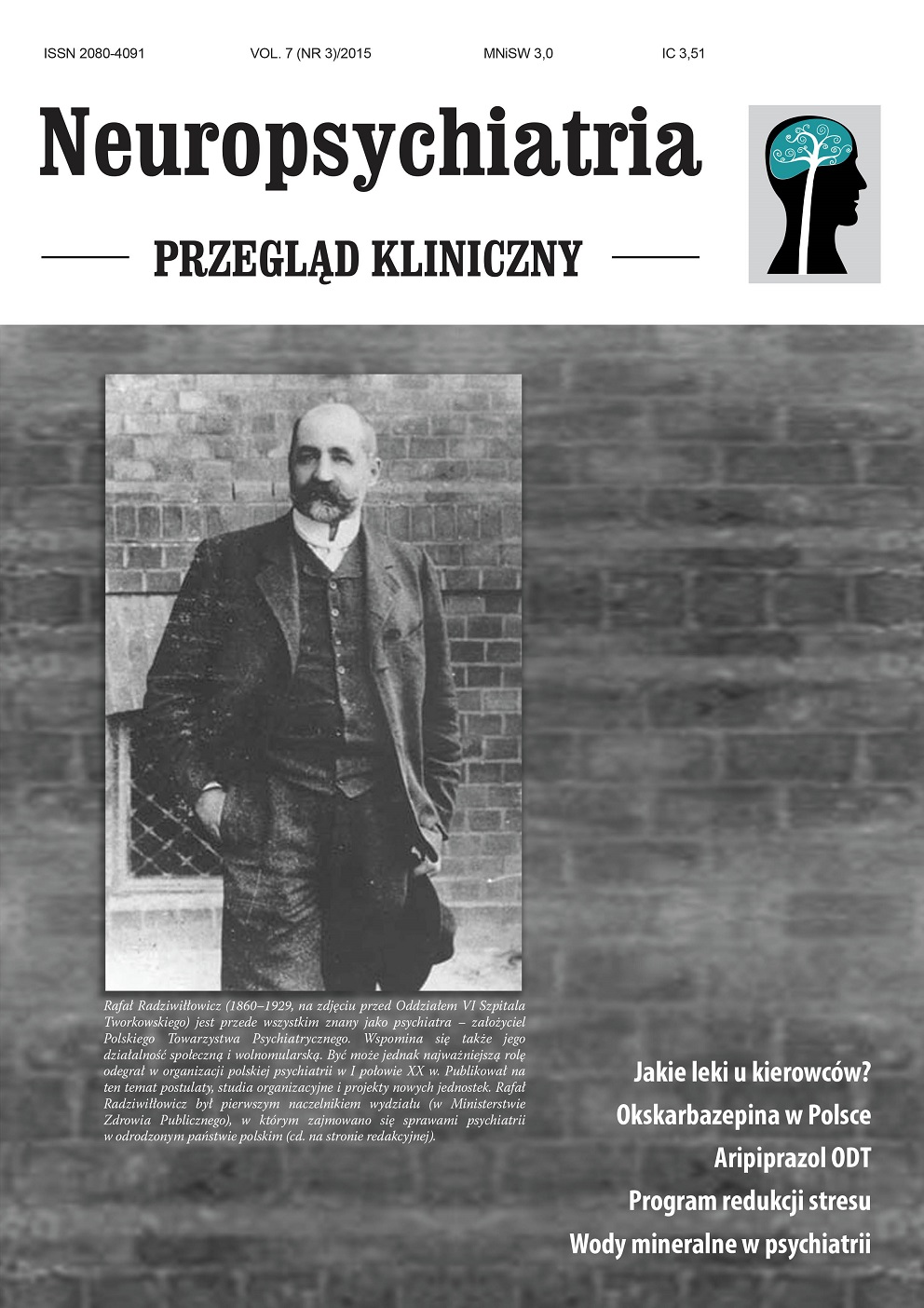Supplemental sulphide mineral water therapy in patients with emotional disorders Original article
Main Article Content
Abstract
Mineral waters may improve some clinical conditions, like lithium water in affective disorders or sulphide water in oxidative stress, inflammation, burnout, and fatigue conditions. National Institute of Public Health – National Institute of Hygiene issues certificates confirming the healing properties of mineral waters. The curative mineral water must come from natural sources and contain minerals and other soluble substances that determine the therapeutic value of the water. Despite the popularity of spa treatments, almost no one carries out randomized research on the effectiveness of mineral waters, which was the immediate reason for conducting the present trial.
The study was based on the LW-1 certified water, using it as a supplemental therapy in patients being treated for emotional disorders. Thirty patients recruited in outpatient clinics were randomized 1 : 1 to the group with sulphide water (SW) or potable water (PW) supplementation, accompanying the stable treatment schedule. At baseline and after 2 weeks of treatment, Short Form 36 (SF-36), Emotional Exhaustion subscale from Maslach Burnout Inventory (MBI), and Clinical Global Impression (CGI) scales were completed. All 30 patients completed the study. SF-36 improved significantly in the SW group (p = 0.0015), compared to no significant effect in the PW group as well as MBI improved significantly only in the SW group (p = 0.043). The CGI scores demonstrated improvement trends (p = 0.001) only in the SW group. Patients randomized to sulphide water supplementation demonstrated multidirectional improvement in their psychosomatic well-being markers.
Article Details

This work is licensed under a Creative Commons Attribution-NonCommercial-NoDerivatives 4.0 International License.
Copyright: © Medical Education sp. z o.o. License allowing third parties to copy and redistribute the material in any medium or format and to remix, transform, and build upon the material, provided the original work is properly cited and states its license.
Address reprint requests to: Medical Education, Marcin Kuźma (marcin.kuzma@mededu.pl)
References
2. Zeitschrift f. Untersuchung der Lebensmittel. 27. Hauptversamlung Deutscher Nahrungsmittelchemiker.
3. Rozporządzenie Ministra Zdrowia z dnia 31 marca 2011 r. w sprawie naturalnych wód mineralnych, naturalnych wód źródlanych i wód stołowych. Dz.U. z 2011 r. nr 85, poz. 466.
4. Ohgami H, Terao T, Shiotsuki I et al. Lithium levels in drinking water and risk of suicide. Br J Psychiatry 2009; 194(5): 464-465.
5. Sugawara N, Yasui-Furukori N, Ishii N et al. Lithium in Tap Water and Suicide Mortality in Japan. Int J Environ Res Public Health 2013; 10(11): 6044-6048.
6. Terao T, Ishii N, Shiotsuki I. Lithium in Drinking Water for Dementia and Suicide. Austin J Psychiatry Behav Sci 2014; 1(5): 1022.
7. Dean OM, van den Buuse M, Bush AI et al. A role for glutathione in the pathophysiology of bipolar disorder and schizophrenia? Animal models and relevance to clinical practice. Curr Med Chem 2009; 16(23): 2965-2976.
8. Salim S, Asghar M, Chugh G et al. Oxidative stress: a potential recipe for anxiety, hypertension and insulin resistance. Brain Res 2010; 1359: 178-185.
9. Ware JE Jr, Sherbourne CD. The MOS 36-item short-form health survey (SF-36). I. Conceptual framework and item selection. Med Care 1992; 30(6): 473-483.
10. Maslach C, Jackson SE, Leiter MP. MBI: The Maslach Burnout Inventory: Manual. Palo Alto: Consulting Psychologists Press, 1996.
11. Kristensen TS, Borritz, M, Villadsen E, Christensen KB. The Copenhagen Burnout Inventory: A new tool for the assessment of burnout. Work & Stress 2005; 19: 192-207.
12. Guy W (red.). ECDEU assessment manual for psychopharmacology. Department of Health, Education, and Welfare 1976, Rockville, MD.
13. Marquié JC, Tucker P, Folkard S et al. Chronic effects of shift work on cognition: findings from the VISAT longitudinal study. Occup Environ Med 2015; 72(4): 258-264.

